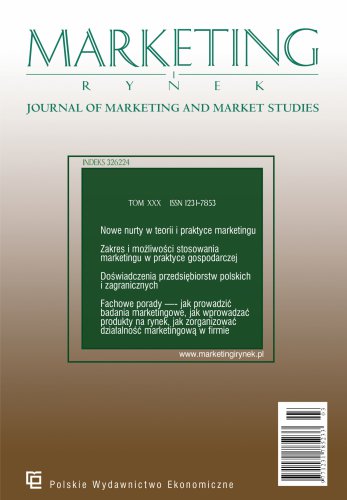Determinants of purchase decisions regarding green products in the opinions of young buyers
Consumers are currently paying increasing attention to environmental issues. At the same time, their awareness of the environmental and climate impact of their purchasing decisions is increasing. This trend is particularly evident among young consumers. The aim of this article is to present the determinants of purchasing decisions regarding green products and their conventional counterparts by young buyers. The article is empirical in nature. The empirical research was conducted in the form of a questionnaire survey on a group of 520 respondents. Based on the results of the analyses, two main factors were identified as important determinants of the purchase of green products by young final buyers – the attribute factor and the relational-promotional factor.
References
Bibliografia/References
Belz, F.-M., & Peattie, K. (2012). Sustainability Marketing: A Global Perspective. John Wiley & Sons.
Buder, F., Feldmann, C., & Hamm, U. (2014). Why regular buyers of organic food still buy many conventional products: product-specific purchase barriers for organic food consumers. British Food Journal, 116(3), 390–404. https://doi.org/10.1108/BFJ-04-2012-0087
Caniëls, M. C. J., Lambrechts, W., Platje, J., Motylska-Kuźma, A., & Fortuński, B. (2021). 50 Shades of green: insights into personal values and worldviews as drivers of green purchasing intention, behaviour, and experience. Sustainability, 13(8), 4140. https://doi.org/10.3390/su13084140
Dybka, S. (2017). Trendy w zachowaniach konsumentów jako czynnik determinujący rozwój przedsiębiorstw. Studia Ekonomiczne, 338, 81–95.
Haws, K. L., Winterich, K. P., & Naylor, R. W. (2014). Seeing the world through GREEN-tinted glasses: Green consumption values and responses to environmentally friendly products. Journal of Consumer Psychology, 24(3), 336–354. https://doi.org/10.1016/j.jcps.2013.11.002
Kalińska-Kula, M. (2016). Marketing produktów ekologicznych – możliwości budowania przewagi konkurencyjnej. Marketing i Zarządzanie, 44, 41–50. https://doi.org/10.18276/miz.2016.44-03
Komor, A., Czernyszewicz, E., Białoskurski, S., Goliszek, A., Wróblewska, W., & Pawlak, J. (2020). Przemiany w konsumpcji żywności w Polsce w świetle uwarunkowań społeczno-ekonomicznych. Instytut Naukowo-Wydawniczy „Spatium”.
Kułyk, P., & Dubicki, P. (2019). Uwarunkowania zachowań konsumentów na rynku żywności ekologicznej. Problemy Rolnictwa Światowego, 19(1), 79–87. https://doi.org/10.22630/PRS.2019.19.1.7
Lewicka-Strzałecka, A. (2015). Mit społecznie odpowiedzialnego konsumenta. Marketing i Rynek, (10), 4–9.
Łuczka, W. (2016). Zrównoważona konsumpcja i uwarunkowania jej rozwoju. Handel Wewnętrzny, (6/365), 136–145.
Mazurek-Łopacińska, K. (2020). Ekologizacja konsumpcji w kontekście bezpieczeństwa produktów żywnościowych. W: A. Dąbrowska (Red.), Bezpieczeństwo konsumentów na rynku żywności (15–28). Oficyna Wydawnicza SGH.
Mazurek-Łopacińska, K., & Sobocińska, M. (2018). Ecologisation of consumption as a trend in consumer behaviour – implications for future research. International Business and Global Economy, 37. https://doi.org/10.4467/23539496IB.18.030.9403
Moisander, J. (2007). Motivational complexity of green consumerism. International Journal of Consumer Studies, 31(4), 404–409. https://doi.org/10.1111/j.1470-6431.2007.00586.x
Mostafa, M. M. (2007). Gender differences in Egyptian consumers' green purchase behaviour: The effects of environmental knowledge, concern and attitude. International Journal of Consumer Studies, 31(3), 220–229. https://doi.org/10.1111/j.1470-6431.2006.00523.x
Neale, A. (2015). Zrównoważona konsumpcja. Źródła koncepcji i jej zastosowanie. Prace Geograficzne, 141, 141–158. https://doi.org/10.4467/20833113PG.15.014.4066
Paladino, A., & Ng, S. (2013). An examination of the influences on "green" mobile phone purchases among young business students: An empirical analysis. Environmental Education Research, 19(1). https://doi.org/10.1080/13504622.2012.687044
Ratajczyk, M. (2016). Przejawy świadomej konsumpcji w zachowaniach młodych konsumentów. Przedsiębiorczość i Zarządzanie, 17(4.3), 119–130.
Tomasin, L., Pereira, G. M., Borchardt, M., & Sellitto, M. A. (2013). How can the sales of green products in the Brazilian supply chain be increased? Journal of Cleaner Production, 47, 274–282. https://doi.org/10.1016/j.jclepro.2013.01.028
Wasilik, K. (2014). Trendy w zachowaniach współczesnych konsumentów – konsumpcjonizm a konsumpcja zrównoważona. Konsumpcja i Rozwój, 1(6), 66–74.
Witek, L. (2018). Postrzegana wartość produktu ekologicznego a rzeczywiste zachowania konsumentów. Prace Naukowe Uniwersytetu Ekonomicznego we Wrocławiu, (526), 214–222. https://doi.org/10.15611/pn.2018.526.19
Witek, L. (2019). Zachowania nabywców wobec produktów ekologicznych. Determinanty, model i implikacje dla marketingu. Oficyna Wydawnicza Politechniki Rzeszowskiej.
Witek, L., & Szalonka, K. (2017). Percepcja zdrowej żywności a zachowania konsumentów. Zeszyty Naukowe SGGW – Ekonomika i Organizacja Gospodarki Żywnościowej, 120, 159–174. https://doi.org/10.22630/EIOGZ.2017.120.46
Young, W., Hwang, K., McDonald, S., & Oates, C. J. (2010). Sustainable consumption: Green consumer behaviour when purchasing products. Sustainable Development, 18(1), 20– 31. https://doi.org/10.1002/sd.394

